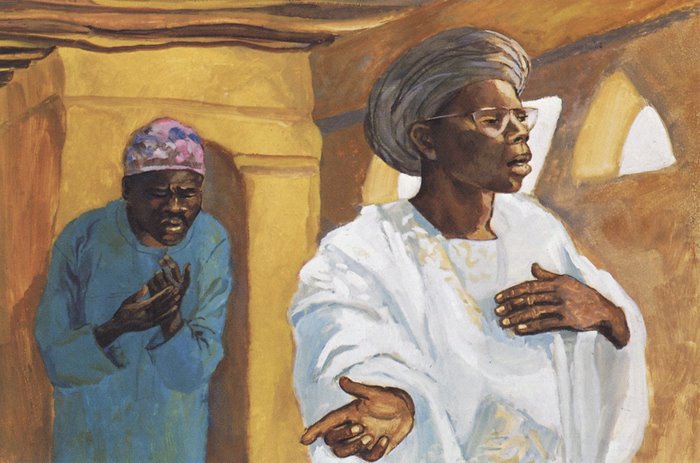
The Pharisee and the Publican
JESUS MAFA, 1973
My dear friends,
The parable from Luke18:9-14, where Jesus narrates the story of the Pharisee and the tax collector, offers profound insights into the nature of genuine humility, the pitfalls of ego, and the essence of righteousness.
to some who trusted in themselves
that they were righteous
and regarded others with contempt:
"Two men went up to the temple to pray,
one a Pharisee and the other a tax collector".
- Luke18:9-10
The temple, a sacred space where humans approach the divine, is where these two men stand. Their external presence in this holy place is the same, but their internal states are contrasting. We often find such contrasts in our world. There are those who outwardly seem very religious, virtuous, and pious but inwardly may be filled with pride and arrogance. And then, there are those who might seem distant from spiritual practices, but their hearts are filled with genuine humility.
I fast twice a week; I give a tenth of all my income.'"
- Luke18:11-12
The Pharisee represents the danger of self-righteousness. It is easy for us, particularly when we walk the spiritual path, to fall into the trap of thinking highly of ourselves. We might think, "Look at my virtues, my practices, my sacrifices for the path." This form of spiritual ego is subtle and dangerous. It divides and categorizes people based on superficial judgments. The Pharisee, in his prayer, isn’t really conversing with the Divine. Instead, he's praising himself, using God as a mere witness to his supposed superiority.
but was beating his breast and saying, 'God, be merciful to me, a sinner!'"
- Luke18:13
On the other hand, the tax collector embodies the essence of humility. In many traditions, including Buddhism, we are taught that recognizing our own imperfections is the beginning of genuine spiritual practice. The tax collector does not pretend or hide. His plea, "God, be merciful to me, a sinner!" is a direct recognition of his own frailties. It is a call from the heart, devoid of pretensions.
In the Tibetan Buddhist tradition, we often speak of the importance of Bodhicitta, the altruistic intention to attain enlightenment for the benefit of all sentient beings. This pure intention emerges when we dissolve our ego, our self-centeredness, and open our hearts in compassion and humility.
for all who exalt themselves will be humbled, but all who humble themselves will be exalted."
- Luke18:14
This principle is universal: When we are blinded by pride, we create a distance not only from others but also from our true nature. But in humility, we become open vessels for grace and blessings.
In our daily lives, let us remember the essence of this parable. Let us approach life, not as the Pharisee, standing tall in the arrogance of self-righteousness, but as the tax collector, with a heart bowed in humility, recognizing our own imperfections and ever willing to learn and grow.
In humble emptiness, may we each become a receptacle of grace — a chalice of love, compassion, and wisdom for all sentient beings.
I will regard myself as the lowest among all,
And from the depths of my heart
Cherish others as supreme.
- Geshe Langri Thangpa, Eight Mind Training Verses, v.2